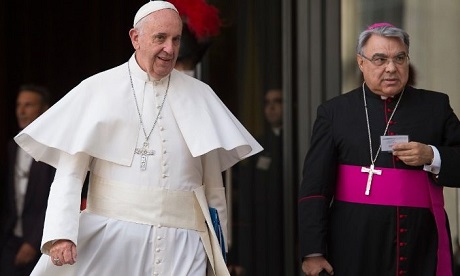The Vatican’s progress report on the future constitution governing the Roman Curia is “An intense work of consultation and mutual listening”.
Doctrine alone is no longer enough to reach an increasingly post-Christian world, says Bishop Marcello Semeraro, Secretary of the Council of Cardinals.
He points out that a “fundamental perspective” of Pope Francis’s reform efforts come from his emphasis on a missionary Church in his 2013 apostolic exhortation Evangelii Gaudium.
“The pope speaks of missionary conversion, transformation of the Church,” Semeraro says.
“We are no longer in the regime of Christendom. What counts above all is the proclamation of faith.”
Perceptions are rapidly changing, and much of modern society is “no longer within Christianity,” he says.
In the current cultural climate, Semeraro says “it is not enough to focus on the order of doctrine, but above all the proclamation … a proclamation which brings joy, otherwise it wouldn’t be the Gospel.”
When the Council of Cardinal Advisors began the consultation process for Curia reform back in 2013, Semeraro says almost all the Vatican’s dicasteries had been heard in a real “general review of public policies” of the Vatican and the Church’s government.
The new draft constitution has now been sent to all of them and, in an unprecedented move, to episcopal conferences, universities and canon lawyers.
“The Curia is a service structure and it was necessary to reform it so that it better corresponds to the needs of the world”, Semeraro explains.
“It was created by Pope Sixtus V at a time when the law of the Church and the law of the State corresponded. However, we cannot pretend that the world has not changed.”
Some points of the new apostolic constitution, provisionally known as Predicate Evangelium (Preach the Gospel), have been closely examined.
For example, in the section about the Dicastery for Promoting Integral Human Development, there is a reference to the United Nations Millennium Development Goals.
The text comes from the United Nations (UN) and not of the Church.
This has raised the concerns of those who want to continue to see the Church as a “perfect society” separated from a world from which it has nothing to learn. They are contesting the UN reference.
Others wonder about the place of women in the future Curia.
Semeraro says in future, women will not only be able to be members of the various dicasteries but also to take up the highest positions, including being prefect of the dicastery.
“The sacrament of holy orders will no longer be required for positions of responsibility, only baptism,” the secretary of the Council of Cardinals says.
The strong place given to episcopal conferences in the future constitution has caused grumbling of apostolic nuncios, who recently gathered in the Vatican.
They are concerned their power over local episcopates may be diminished.
Pope Francis’s recent closed-door discussion with the nuncios gave him an opportunity to re-explain how he sees their role.
The Council of Cardinals’ next task will be to study the many reactions to its draft constitution.
Some bishops’ conferences have yet to meet to discuss the draft, while others have not even received it.
Semeraro says the document may have been blocked by the antivirus software in the mailboxes of some bishops’ conference presidents.
“Perhaps [the Council of Cardinals] will even be able to hand over the final draft constitution to the pope in September. It will then be up to him to decide whether or not to publish it,” he says.
Source
Additional readingNews category: World.




